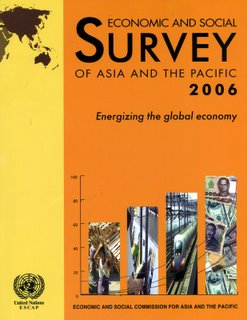Culture, books, contact sports and reflections about life - or lack of it - beyond work and the cubicle.
Tuesday, April 25, 2006
From Blogger to Wordpress!
Thanks a lot and hope you continue reading my blog.
dave
Malacañang flip-flops on EVAT
WE thought all along that Malacañang badly wanted the EVAT implemented to address the budget deficit and balance the budget by 2008. That is why, against widespread protests, the government raised the value added tax on many products including petroleum from 10 to 12 percent, and expanded its coverage to other products that were not previously covered.
When the Supreme Court finally the lifted temporary restraining order that delayed EVAT’s implementation, Malacañang rejoiced, telling the people that the country could now achieve fiscal consolidation, and that soon the sovereign rating agencies including Fitch and Moody’s are going to get nicer with us, thus enabling the country and its entrepreneurs access to cheaper money for economic expansion.
That is why we were surprised by the recent announcement by no less than presidential chief of staff Michael Defensor saying Malacañang might recommend to Congress the suspension of the coverage of the EVAT law on petroleum products, supposedly to help cushion the impact of rising crude prices on goods and services. Defensor even dared Congress to legislate the EVAT amendment on its own without any prodding from the Palace if it believes in the urgency of the measure.
“The Senate can see that the ones to be most affected by this issue are the people so they would surely cooperate,” said Defensor to Palace reporters. “This is not for the President but for the people.”
Why the sudden of heart? How come, all of a sudden it’s Palace officials who are so hell-bent on reversing hard fought reform measure? Why is Malacañang leading the way for policy backsliding?
Certainly, the proposal looks politically attractive but its definitely ridiculous when viewed from economic and governance perspectives. Suspending VAT coverage of petroleum products means we may have to kiss goodbye the objective of consolidating the country’s finances. The initial estimate says the country will forgo collection of at least P20 billion a year, translating in the continuing lack of investments in economic and social infrastructure that is needed for economic takeoff. Albay Rep. Joey Salceda said the government could compensate for the losses by selling more government assets, but we know that this process takes forever to yield money for the government.
The proposed suspension really doesn’t make sense because its impact will only be temporary. Movements of crude prices in the world market are determined by a host of factors beyond Malacañang’s control (e.g. rising demand from
Common sense dictates that the best measure to deal with volatile crude prices is to allow fuel prices to rise to market levels. This is painful but sensible, as real prices necessarily drive fuel consumption. When prices are high, the sensible thing to do is reduce consumption and this could be achieved through old-fashioned energy conservation measures, including the traffic demand management measures. In fact, allowing market forces alone to determine prices would force people to modify their behavior in order to conserve energy. Of course, this policy should be complemented by other means, including encouraging private investments in alternative energy sources (ethanol, biodiesel, natural gas, wind, among others).
It’s apparent that the proposal to suspend EVAT coverage of petroleum products is really all about making political scores—a fair assumption, seeing the recent spate of populist policy announcements. Palace officials were not bothered by one AFP area commander’s reported remarks about issuing shoot-to-kill orders for suspected military rebels. And yet, just a few days before, the President announced the commutation of death sentences of rapists, murderers, and terrorists. Sensing that it was a popular move, Malacañang announced it will work for repeal of the death penalty law.
Early last year, Malacañang told the world the debate on the mining law was over after the Supreme Court ruled with finality that the Mining Act is constitutional. After that, the government and the private sector sent delegates on a roadshow abroad to tell foreign business the
Policy flip-flops are sometimes seen as signs of either a sincere change of mind, a lack of political will, or plain cluelessness. Yet they could also indicate cynical politics at work.
Saturday, April 22, 2006
Charter change on a chartered train
THE D-day is to fall on July 2006. By this time, the
Wednesday, April 19, 2006
Where might public opinion go on charter change?
THE credibility and trustworthiness of advocates for or against Charter change will matter in the Filipino people’s decision should there be a plebiscite on the governments proposal to change the Constitution, a political analyst from Pulse Asia said Tuesday.
Tuesday, April 18, 2006
Jobless growth
THE
Sunday, April 16, 2006
UN says job scarce countries should emulate the Philippines
 The United Nations has recently urged countries in the Asia Pacific Region plagued with high underemployment rates and limited opportunities for formal sector jobs to emulate the example set by the
The United Nations has recently urged countries in the Asia Pacific Region plagued with high underemployment rates and limited opportunities for formal sector jobs to emulate the example set by the In a recent report entitled “Economic and Social Survey of Asia and the Pacific 2006,” the Economic and Social Commission for Asia and the Pacific (Escap) of the United Nations said remittances sent my migrants and temporary workers on contract abroad to their families have greatly helped to raise the standard of living of some of the poorest sections of society in South Asia, South-East Asia, and the Pacific region.
India
“Liberalization of financial markets has made it easier to remit money from one country to another,” said the UN report. “A surge in the number of bank branches seeking remittance-related business in host countries and providing increased range of financial services has also played an important role. Changes in the skill composition of workers going abroad has further contributed to the higher remittance flows [in] the last two to three years."
In the last few years, critics in the
“Remittances increase a country’s international credit worthiness and lead to lower borrowing costs,” said the UN report. “Furthermore, remittances tend to be stable and countercyclical, thus smoothing out household consumption and investment patterns during episodes of unemployment and high inflation in home countries.”
The report suggests that remittances at current levels, while rising, tends to be underestimated due to continuing high transactions costs that serves as disincentives to sending money home.
“Fees charged by remittance service providers are very high in comparison to the actual costs incurred in transferring the funds,” said the UN report. “For small transfers, fees can reach as high as 10 to 15 percent of the money sent home. For poor migrant workers, who generally send small sums of money, this has encouraged the growth of informal channels for remittances.”
The report urged governments in the Asia-Pacific region that remittances are “private flows of money” that should not be taxed as these incomes were already taxed from the point of origin. Taxes, the report said, would only discourage the transfer of funds through the formal channels.
“Over the medium-term, investments by sending countries in training to produce workers could create a larger pool of workers who could respond to changing market conditions in the worker-receiving countries,” the UN report said. “Once workers can move beyond unskilled jobs and secure higher paying semi-skilled and skilled jobs, their earnings should rise, enabling them to send more money home.”
Tuesday, April 11, 2006
Political dividends from the expanded value added tax
PORK is pork is pork and is unhealthy to the Philippine economy. Why should it be otherwise?
It’s apparent, however, that Malacañang’s efforts to grease the proposed budget through the wheels of Congress is just a smokescreen for the grand design related to Charter change and the political survival of President Arroyo. In an interview with BusinessMirror, Sen. Manuel Villar, the Senate finance committee chief, noted that Malacañang never intended the budget to pass—the design being, so that they would automatically reenact the 2005 budget that would give them the maximum flexibility to use the money as “incentives” to members of Congress and local government executives to dance the Cha-cha. The reenacted budget therefore is one big sleazy pork barrel where every politician could dip his or her hands into, in order to ensure that they would all toe the line. By July, it’s expected that the Opposition will launch another impeachment initiative arising out of the “Hello Garci” controversy, among others, and the one big pork, the reenacted budget, will take care of them.
But all this is a virtual smoke-and-mirrors exercise for the real drama which is the Cha-cha and this administration’s political survival.
Monday, April 10, 2006
Leftists should leave call centers alone!
Recently, KMU, a leftist “labor” organization criticized call centers as a hub of exploitation, stressing that local labor is just a small fraction of what local call center agents get in the
If there are people who should complain about “call center exploitation” it should be the call center agents themselves, and not the KMU. These people are smart and tech-savvy; they have all the avenues for their grievances. They could always post their complaints in web fora and web logs but try surfing about “call center exploitation” and you can’t find one entry. Well there are the usual rantings about call center life but these people know they could always leave and find life elsewhere. If they don’t like their work environment, they could always get another outsourcing job and they don’t need labor unions to represent them. Yes, workers in call centers are empowered. Call centers in fact pay them before they start working or even during their training stage, and they get more benefits including night differentials, rice allowances, and performances bonuses. Yes, the call centers actually do all they can to retain staff knowing that agents could always find another job somewhere.
Given its socialist, nay communist, ideology, KMU necessarily longs for a socialist smokestack utopia that no longer exists (not even in
Sunday, April 09, 2006
The devil's budgeting system in the Philippines
Don’t you wonder why
Tuesday, April 04, 2006
Getting intoxicated with call centers?
 THE graduation season is here again and fresh graduates—400,000 of them—are probably now wondering whether or not there’s a place for them in the country’s job market. If one is reading the newspapers, especially the weekend editions, it would appear that there are indeed fresh opportunities for them: call centers and outsourcing companies. Of course, there are always overseas jobs for skills that are in demand abroad (e.g. teachers, caregivers, pilots, mechanics, geologists, among others).
THE graduation season is here again and fresh graduates—400,000 of them—are probably now wondering whether or not there’s a place for them in the country’s job market. If one is reading the newspapers, especially the weekend editions, it would appear that there are indeed fresh opportunities for them: call centers and outsourcing companies. Of course, there are always overseas jobs for skills that are in demand abroad (e.g. teachers, caregivers, pilots, mechanics, geologists, among others).On the part of policy makers the big question should be: Would call centers and related industries that are “globalized,” overseas employment, actually solve the problem of joblessness in the country? It’s high time that policy makers ponder this because it appears that the hype created by this emerging industry and its supposed benefits to the economy seems to have lulled the government into complacency. Since the passage of the reformed VAT for instance, the government seemed to have totally lost the appetite for real reforms.